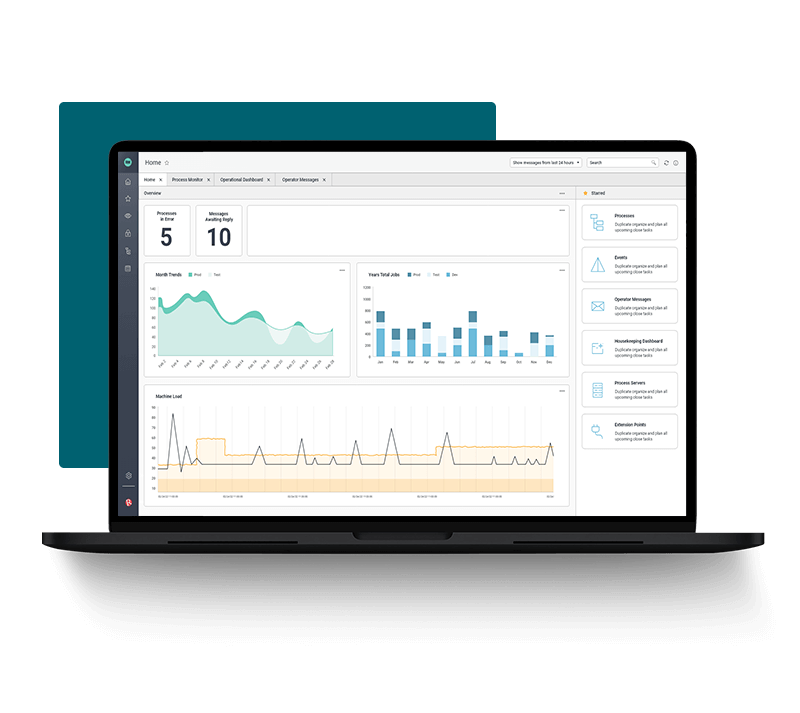Oracle Job Scheduler: Integrate Oracle Database with Redwood
Oracle processes are completed 1.5-6 times faster than average when using Redwood.


Built for the Cloud
Redwood’s cloud-native platform is designed to evolve with the growing needs of a scaling business. Teams can finally overcome the limitations of built-in ERP scheduling tools by orchestrating SAP, Oracle and other ERP functions natively.
Teams use Redwood as an enterprise manager for complex jobs, cross-application orchestration, and centralize workload management. Redwood is a vital database administration tool for database administrators (DBAs) and sys admins working with Oracle solutions.
-
Centralized Orchestration and Automation
Apps, systems, servers, data sources, and web services can all be centralized under the RunMyJobs by Redwood SaaS platform. Processes can be optimized across both Oracle and non-Oracle applications with no limitations on instances, servers, or time zones.
-
More Control of End-to-End Business Processes
Organizations manage IT and business processes seamlessly across applications through every stage of the lifecycle. This empowers teams to stay ahead of issues with proactive monitoring and notifications.
-
Connect Instantly with Built-In Oracle Integrations
Automation initiatives can be launched quickly with Redwood’s library of built-in integrations for a variety of Oracle applications.

RunMyJobs by Redwood: The Best Oracle Scheduler
RunMyJobs by Redwood is extremely intuitive, with a drag-and-drop graphical editor and extensive library of templates. Developers love the support for 25+ scripting languages, including Java and shell scripts, with syntax highlight and parameter replacement included.
As the only workload automation solution designed for delivery as SaaS from the beginning, Redwood eliminates the hassle of hosting, employing, and maintaining an automation platform. A lightweight self-updating agent can control servers and run shell scripts for Windows, Linux, macOS, and more.

Integrate Oracle Databases with Redwood
Integrate and automate Oracle database processes with Redwood:
- Manage data and database dependencies within critical business processes
- Process the right data exactly when needed and transfer it to the right place
- Automated job scheduling based on data readiness
Oracle Job Scheduler Frequently Asked Questions
Is there a native Oracle job scheduler?
Yes, Oracle provides a native job scheduling feature called Oracle Scheduler. Oracle Scheduler is a job scheduling system within the Oracle database that automates tasks and programs. Oracle Scheduler has a robust and flexible framework for creating, scheduling, and managing jobs and job chains.
What does scheduler_jobs do in Oracle?
In Oracle, the scheduler_jobs table is not a standard Oracle database object. However, there is a similar object called dba_scheduler_jobs.
The dba_scheduler_jobs view contains job details like job name, job type, job actions, job schedules, and job status. DBAs can query and monitor jobs from this view for better database administration.
Some important columns in the dba_scheduler_jobs view include:
JOB_NAMEJOB_TYPEJOB_ACTIONSTART_DATEEND_DATESCHEDULE_NAMEREPEAT_INTERVALJOB_CLASS
Job type can include PLSQL_BLOCK for a PL/SQL block, STORED_PROCEDURE, and EXECUTABLE. And job class refers to the class assigned to the job, if any. The job action can be a PL/SQL block, stored procedure name, or executable program.
Expressions for calendaring include BYDAY, BYHOUR, BYMINUTE, AND BYSECOND to specify when jobs will run.
Discover Redwood’s job scheduling capabilities designed for ERP systems and applications.
What does _SCHEDULER_ JOB_ID show in the DBA_SCHEDULERS table?
In the DBA_SCHEDULERS table, the _SCHEDULER_JOB_ID column does not exist and is not a standard column or placeholder in the Oracle database schema.
The DBA_SCHEDULERS table provides information about the schedulers defined in the Oracle database. It contains columns including SCHEDULER_NAME, SCHEDULER_TYPE, NUMBER_OF_CPUS, ACTIVE_INSTANCES, and more. These columns store details about the scheduler configurations and characteristics.
Learn how to automate processes from anywhere across a hybrid cloud environment with Redwood.
How do you create a scheduler job in Oracle (with example)?
The DBMS_SCHEDULER.CREATE_JOB procedure can be used to create a scheduler job in Oracle. The below example is designed for SQL developers and shows a job that runs minutely:
BEGIN DBMS_SCHEDULER.CREATE_JOB (
job_name => 'MY_SCHEDULER_JOB',
job_type => 'PLSQL_BLOCK',
job_action => 'BEGIN
-- Job logic goes here
NULL;
END;',
start_date => SYSTIMESTAMP,
repeat_interval => 'FREQ=MINUTELY',
enabled => TRUE,
auto_drop => FALSE,
comments => 'This is my scheduler job'
);
END;
Once the job is created, it will run minutely according to the specified schedule. Users can monitor job execution and view the job log file using various views like DBA_SCHEDULER_JOB_RUN_DETAILS and DBA_SCHEDULER_JOB_LOG. The DBMS_SCHEDULER.DISABLE, DBMS_SCHEDULER.STOP_JOB, and DBMS_scheduler.drop_job procedures will disable procedures, drop jobs, or stop jobs.
SYSTIMESTAMP will return system data in the timestamp return type.
RunMyJobs by Redwood transforms businesses with workload automation that’s easy to use.
How do you run a scheduler job in Oracle?
To run a scheduler job in Oracle, the DBMS_SCHEDULER.RUN_JOB procedures can be used along with other relevant SQL procedures from the exec DBMS_SCHEDULER package.
DECLARE
job_name VARCHAR2(100) := 'MY_SCHEDULER_JOB';
BEGIN
DBMS_SCHEDULER.RUN_JOB(job_name);
END;
/
In the above example, the job_name is set to MY_SCHEDULER_JOB. This will run the scheduler job as long as it’s been enabled using the DBMS_SCHEDULER.ENABLE procedure.
IT and business processes can be orchestrated in one centralized automation platform with Redwood.
What does the program_name procedure do in Oracle?
In Oracle, the DBMS_SCHEDULER.SET_ATTRIBUTE procedure modifies attributes of a program associated with a scheduler job. The program_name parameter specifies the name of the program to be modified.
The program_name parameter represents the name of the program associated with a scheduler object or job. When passed to the DBMS_SCHEDULER.SET_ATTRIBUTE procedure it identifies the specific program that’s being modified.
The program_type parameter specifies the type of program being modified. This can be a stored procedure, executable, or external shell script. Program_action defines the action for the program.
Define_program_argument defines arguments for a program. Arguments can be passed to a program to provide dynamic values or inputs during execution.
Number_of_arguments is the number of arguments defined for a program. The program_name procedure is used in conjunction with this parameter to define and manage program arguments.
There is predefined metadata arguments that can be passed to programs if program logic is dependent on the scheduler environment.
Redwood integrates easily with ERP systems to orchestrate and automate Oracle workflows.